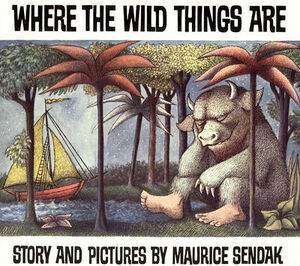Where The Wild Things Are (nonfiction): Difference between revisions
No edit summary |
|||
| Line 8: | Line 8: | ||
It was voted the number one picture book in a 2012 survey of School Library Journal readers, not for the first time. | It was voted the number one picture book in a 2012 survey of School Library Journal readers, not for the first time. | ||
== In the News == | |||
<gallery mode="traditional"> | |||
File:Johnson-Wax Frank-Lloyd-Wright.jpg|link=Egg Tooth (monster)|Fugitive monster [[Egg Tooth (monster)|Egg Tooth]], hidden among Frank Lloyd Wright's "lily pad" pillars in the Johnson Wax Headquarters. | |||
</gallery> | |||
== Nonfiction cross-reference == | == Nonfiction cross-reference == | ||
Revision as of 07:24, 15 June 2016
Where the Wild Things Are is a 1963 children's picture book by American writer and illustrator Maurice Sendak, originally published by Harper & Row.
The book has been adapted into other media several times, including an animated short in 1974 (with an updated version in 1988); a 1980 opera; and a live-action 2009 feature-film adaptation, directed by Spike Jonze.
The book had sold over 19 million copies worldwide as of 2009, with 10 million of those being in the United States.
Sendak won the annual Caldecott Medal from the children's librarians in 1964, recognizing Wild Things as the previous year's "most distinguished American picture book for children".
It was voted the number one picture book in a 2012 survey of School Library Journal readers, not for the first time.
In the News
Fugitive monster Egg Tooth, hidden among Frank Lloyd Wright's "lily pad" pillars in the Johnson Wax Headquarters.
Nonfiction cross-reference
Fiction cross-reference
External links
- Where The Wild Things Are @ wiki.karljones.com
- Where the Wild Things Are @ Wikipedia

